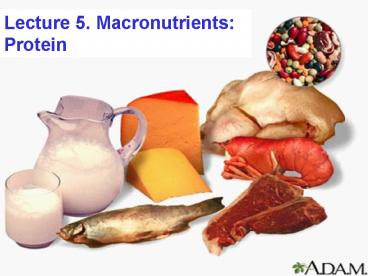Lecture 5' Macronutrients: Protein - PowerPoint PPT Presentation
1 / 24
Title:
Lecture 5' Macronutrients: Protein
Description:
RDI recommended dietary intakes. AMERICAN. DRI dietary reference intakes ... refried beans & Tacos (corn) stir-fried vegetables & rice. Protein requirements ... – PowerPoint PPT presentation
Number of Views:262
Avg rating:3.0/5.0
Title: Lecture 5' Macronutrients: Protein
1
Lecture 5. Macronutrients Protein
2
from last Lecture (RDIs)
- AUSTRALIAN
- RDI recommended dietary intakes
- AMERICAN
- DRI dietary reference intakes
- Whitney Rolfes 10th Ed. (2005)
- Inside front cover
- RDA recommended dietary allowance
- Whitney Rolfes 10th Ed. (2005)
- Chapter 1 Dietary Reference Intakes (pp16-18)
3
Amino Acid structure
- H
- central carbon atom
- H C H
- H H H O
- H C C C C C OH
- organic acid group
- H H H N Carboxyl group
- side group H H
- amino group
4
Protein
- Basic unit AMINO ACID
- Protein POLYPEPTIDE of 50-300
- amino acids
- eg. human Insulin has 51 amino acids (very small)
- more complex larger molecules than CHO
- due to side group
5
Amino Acids
- 22 common amino acids in food
- each has a different side group
- Figure 6.2 (p. 183) Examples of Amino Acids.
Whitney Rolfes 10th Ed. - constituent amino acids characterize a PROTEIN
- eg. protein of BEEF muscle different to protein
of PORK muscle - Figures 6-4 and 6-5 (p. 184), Structures of
Insulin and Haemoglobin. Whitney Rolfes 10th
Ed.
6
Amino Acids structural functional roles
- cell membrane
- connective tissue
- (collagen elastin)
- inert protein
- (hair nails)
- enzymes
- blood proteins
- (albumin haemoglobin)
- antibodies
- skeletal smooth muscle
- 20 energy source
7
Protein
- AAs continually synthesised catabolised in the
body - daily turnover ?3 - 4g/kg body weight/day
- dietary intake ? ¼ - ½ this amount
8
- MOST Protein made from recycling amino acids
- synthesise
- new proteins essential, from food or
already in body
9
Essential (indispensable) amino acids
- new protein synthesis requires full complement of
amino acids - cannot make part proteins
- other AAs are wasted (deaminated)
- most amino acids synthesised in the body
- need Nitrogen for amine group
- C-fragments H atoms from CHO or Fat molecules
AND/OR from degraded AAs in the body
10
Essential (indispensable) amino acids
- 8 (9 in children) cannot be synthesised in the
body - ? MUST BE SUPPLIED FROM FOOD
11
Essential (indispensable) amino acids
- Histidine (in children)
- Isoleucine
- Leucine
- Lysine
- Methionine
- Phenylalanine
- Threonine
- Tryptophan
- Valine
- branched chain
- amino acids
12
Protein Quality
- Definition
- the amount of protein in a particular food its
supply of essential amino acids - ANIMAL protein BEST QUALITY
- supplies ALL 8(9) essential amino acids
- usually the HIGHEST concentration
13
Protein Quality
- PLANT protein LESSER quality
- doesnt supply ALL essential amino acids
- LOWER concentration
- exception SOY PROTEIN
14
Plant protein cont...
- combining LEGUME CEREAL protein will ensure ALL
essential amino acids - each food contributes the essential AAs missing
in the other food - COMPLEMENTARY PROTEINS
- (Vegans)
15
Complementary proteins
16
Protein Quality
- eg. Complementary proteins
- baked beans and rice
- peanut butter on bread (wheat)
- refried beans Tacos (corn)
- stir-fried vegetables rice
17
Protein requirements
- 1 gram protein supplies 17kj
- sedentary individuals
- balanced diet 10-15 of Etotal from protein
- athletes
- balanced diet 12-17 of Etotal from protein
18
- Sedentary individuals
- or 0.8g - 1.0g protein/kg body weight/day
- if weight 70kg
- protein requirement will be
- between 70 x 0.8 56g protein/day
- and 70 x 1.0 70g protein/day
19
- Athletes
- elite endurance athletes
- 1.2 - 1.4g protein/kg body mass/day
- oxidisable fuel when CHO stores depleted
- strength power athletes
- 1.2 - 1.7g protein/kg body mass/day
- maintains ve Nitrogen balance
- AAs can be synthesised incorporated into
required protein
20
Protein from food
- Food Protein g/100g
- HIGH CONTENT
- Beef lamb 28
- Cheese 26
- Chicken 25
- Fish 18
- Eggs 12
- Beans 7
- Peas 5
- Milk 3.3
21
- Food Protein g/100g
- MEDIUM CONTENT
- Cornflakes 8.6
- Bread (white) 7.8
- Spaghetti 4.2
- Sweetcorn 4.1
- Rice 2.2
- Cauliflower 1.6
- Potatoes 1.6
- Cabbage 1.3
22
- Food Protein g/100g
- LOW CONTENT
- Apples 0.3
- Honey 0.5
- Butter margarine lt0.4
- Wine 0.1
- Soft drink 0
23
HOMEWORK
- Sedentary individual (70kg body mass)
- 56 - 70g protein/day protein FOOD
- Endurance athlete (75kg body mass)
- 90 - 105g protein/day protein FOOD
- Strength Power athlete (100 kg body mass)
- 120 - 170g protein/day protein FOOD
24
Recommended Reading
- Whitney Rolfes (2005)
- Understanding Nutrition 10th Ed.
- Chapter 6 Protein Amino Acids
- ENTIRE CHAPTER
- AND/OR
- Wahlqvist (2002)
- Food Nutrition
- Chapter 14 Protein
- ENTIRE CHAPTER































